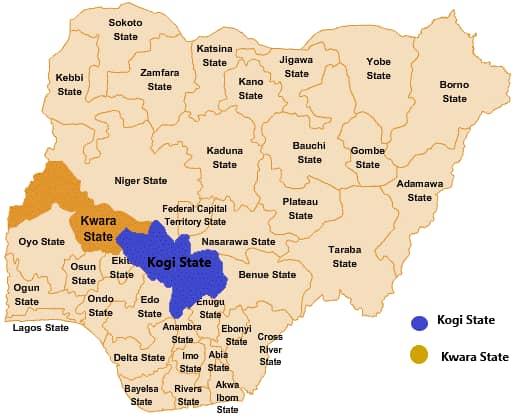Description of RCE and Geographic Region:
RCE Ilorin comprises Kwara and Kogi States of Nigeria. The two states, located in the North-central geo-political zone of Nigeria also fall within the Lower Niger River Basin. According to the National Bureau of Statistics (2016) the two states covering a total land size of 61,180km2 have an estimated total population of 7,666,390 (Kwara – 3,192,900; Kogi – 4,473,490). These states enjoy two main seasons in the year (dry and wet seasons), with the wet season beginning from mid-March to the end of October while the dry season commences in November and ends in March. The wet season is characterised by heavy downpours accompanied by groundwater infiltration and percolation. The rainfall per annum ranges from 1,000 to 1,500mm with 187 to 220mm rainy days. Monthly temperature ranges from 210C to 370C.

Map of Nigeria, highlighting the region (Kwara and Kogi States) that constitutes RCE Ilorin.
Kwara and Kogi States are characterised by varying landforms along the valleys of Niger and Benue rivers, with deep valleys, large hills, mountains and plateaus. The area is generally well drained. The vegetation of RCE Ilorin is Guinea savanna and blessed with alluvial soils, which can be found on the plains or rivers or on deltas, and is good for agriculture. This type of soil also has an added advantage of ensuring that planting can go on throughout the year. Also, the location of the major rivers in this zone makes irrigation relatively easy and this also results in high potentials for agricultural production. The vegetation, soil, and weather patterns are favourable for the production of a wide spectrum of arable and cash crops of various types. Agriculture and forestry are important land use activities and major components of the region’s economy. The notable crops grown in the region are maize, rice, guinea corn, yam, cowpea, citrus, oil palm, cocoa, coffee and kolanut. Cattle, sheep, goat, poultry and fish are also being produced in large number. The forestry sector also provides huge revenue for local and state government in the region through levies and taxes on timber logging.
The people in Kwara and Kogi States have common ethnic and religious backgrounds. The states also have common trade practices, livelihoods and level of literacy. Prominent ethnic groups are Yoruba, Igala, Ebira, Okun, Nupe, and Baruba. The indigenes of the region are some of the politically enlightened people in Nigeria and are presently in the mainstream in the development of the Nigerian economy. The states in RCE Ilorin are within a geographical zone which shares some peculiarities such as boundaries, agricultural productions and educational attributes as well as various cultural affiliations. The major towns in the region include Ilorin, Offa, Omu-Aran (in Kwara State); Lokoja, Okene, Kabba (in Kogi State). The region has some peculiarities that are common to the geographical area. Such peculiarities include high rate of poverty among the populace, food insecurity, low level of education, gender inequality, inadequate access to water, poor sanitation, and environmental degradation. Apart from the University of Ilorin which is one of the highly ranked universities in Nigeria where the Secretariat of the RCE Ilorin being hosted, the region has several other established and highly rated universities and institutions that are into partnership with the University of Ilorin on the Board of RCE Ilorin. These are Kwara State University, Malete; Al-Hikmah University, Ilorin; Al-Hikmah University, Ilorin. The other institutions in partnership with the University of Ilorin on RCE Ilorin are Agricultural and Rural Management Training Institute (ARMTI), Ilorin, and the Lower Niger River Basin Development Authority, Ilorin.